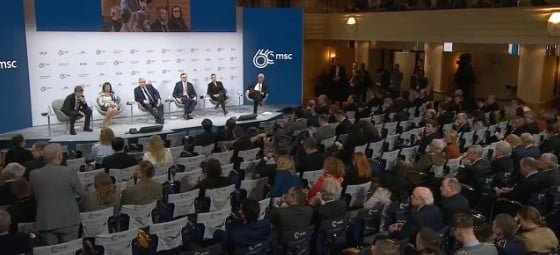At the 60th Munich See the arrival of international leaders for the 60th Munich Security Conference, which starts on Friday, February 16.
The summit was started by UN Secretary-General Antonio Guterres at a crucial moment, when cries for help and support for Ukraine are growing, the US presidential campaign is intensifying, and violence in Gaza is increasing despite appeals for a ceasefire.
The yearly gathering, which advertises itself as the world’s premier forum for discussing international security policy, was predicted to draw about 50 world leaders. Russia’s and Iran’s governments have not received invitations.The conference’s first speaker is expected to be US Vice President Kamala Harris. After giving speeches at the 2022 and 2023 conferences, she returns, but her new responsibility is to guarantee that NATO countries would be safeguarded following
The anticipation builds as international leaders converge in Munich for the 60th installment of the prestigious Munich Security Conference, set to commence on Friday, February 16th. Against a backdrop of escalating geopolitical tensions and pressing global challenges, the summit heralds a critical moment for dialogue, cooperation, and collective action on the world stage.
The conference, inaugurated by UN Secretary-General Antonio Guterres, unfolds amidst a confluence of urgent issues demanding global attention and decisive action. Chief among them is the escalating crisis in Ukraine, where cries for support reverberate amid mounting tensions with Russia. As the international community grapples with the specter of conflict and instability in Eastern Europe, the Munich Security Conference serves as a pivotal platform for diplomatic engagement and strategic dialogue aimed at de-escalating tensions and fostering a peaceful resolution to the crisis.
Moreover, the conference coincides with the intensification of the US presidential campaign, adding an additional layer of complexity to the geopolitical landscape. Against the backdrop of a polarized domestic political environment, global leaders gather in Munich to navigate the shifting dynamics of transatlantic relations and reaffirm their commitment to shared values and strategic alliances.
Meanwhile, the escalating violence in Gaza casts a shadow over the proceedings, underscoring the urgent need for concerted efforts to address the root causes of conflict and advance a sustainable peace process in the Middle East. Despite appeals for a ceasefire, the situation on the ground remains volatile, underscoring the imperative for sustained international engagement and diplomatic initiatives to alleviate the suffering of civilians and prevent further escalation of hostilities.
As the world’s premier forum for discussing international security policy, the Munich Security Conference provides a platform for dialogue, debate, and collaboration among the world’s leading policymakers, diplomats, and security experts. With an anticipated attendance of approximately 50 world leaders, the conference promises to be a forum for frank exchanges and constructive engagement on a wide range of pressing global issues.
Notably absent from the conference are representatives from Russia and Iran, whose governments did not receive invitations to participate.
